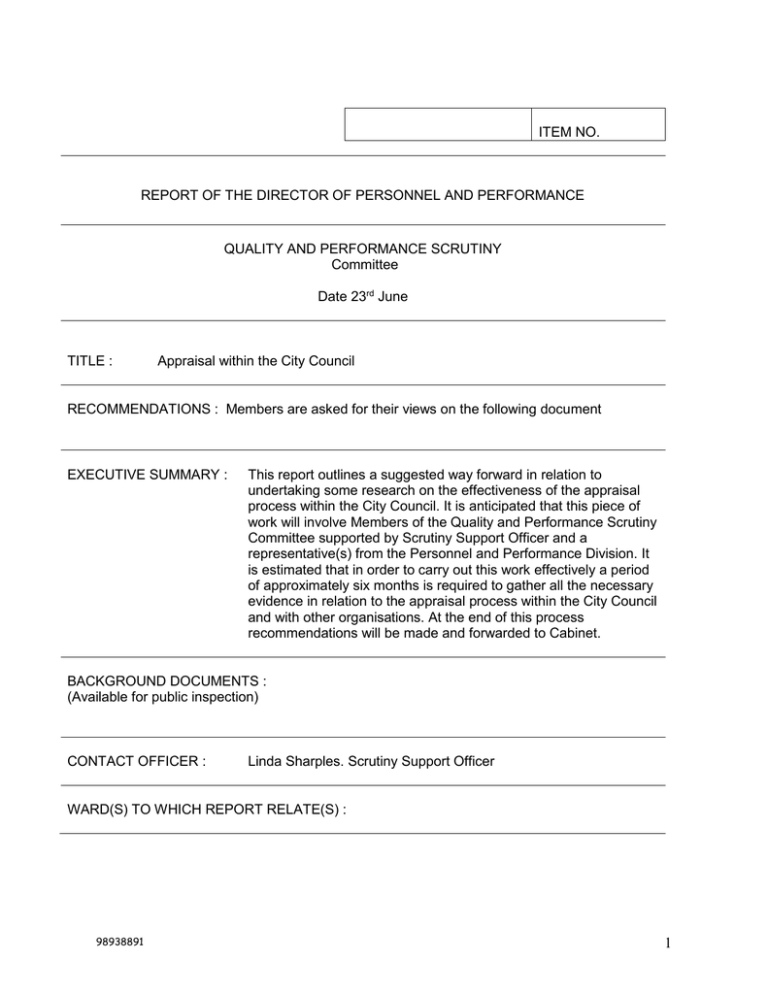Document 16023310
advertisement

ITEM NO. REPORT OF THE DIRECTOR OF PERSONNEL AND PERFORMANCE QUALITY AND PERFORMANCE SCRUTINY Committee Date 23rd June TITLE : Appraisal within the City Council RECOMMENDATIONS : Members are asked for their views on the following document MEND EXECUTIVE SUMMARY : This report outlines a suggested way forward in relation to undertaking some research on the effectiveness of the appraisal process within the City Council. It is anticipated that this piece of work will involve Members of the Quality and Performance Scrutiny Committee supported by Scrutiny Support Officer and a representative(s) from the Personnel and Performance Division. It is estimated that in order to carry out this work effectively a period of approximately six months is required to gather all the necessary evidence in relation to the appraisal process within the City Council and with other organisations. At the end of this process recommendations will be made and forwarded to Cabinet. BACKGROUND DOCUMENTS : (Available for public inspection) CONTACT OFFICER : Linda Sharples. Scrutiny Support Officer WARD(S) TO WHICH REPORT RELATE(S) : 98938891 1 1. Background The Quality and Performance Scrutiny committee have agreed in consultation with the Head of Personnel that a review of the effectiveness of the appraisal system within the City Council should be undertaken. It is believed that a consistent approach to appraisals is not carried out within the authority; consequently the process is likely not being as effective as it could. Therefore this piece of work will look in depth at the following areas to ascertain how the appraisal system is currently working and make recommendations based on the evidence gathered (as outlined below) in relation to the following options regarding the appraisal process in Salford: What are the benefits of the appraisal system and how does this benefit employees and the service? Should there be an agreed corporate system or should this be left to the discretion of directorates? The above questions assume that it is good practice to operate an appraisal scheme and in order to answer the questions it is suggested that the work is carried out as outlined below. 1.1 Evidence Gathering How are appraisals currently being carried out in Directorates, if at all? Statistics in relation to the number of appraisals and the frequency 1.2 Planning How does the appraisal process fit into team plans, directorate service/business plans and council pledges, if at all Outcomes What is currently achieved by appraisals? What do we want to achieve in the future? 1.3 1.4 1.5 98938891 Impact on other areas of service delivery How does the appraisal process impact on other areas such as: Quality Standards, Performance Management, Management of Team, Internal promotions, Training, Equal Opportunities Policy. The way forward for appraisal Do we need a formal appraisal process? If the appraisal process is continued in the future, how should this be done? 2 2 Review Group Membership It is suggested that four or five members of Quality and Performance Scrutiny committee are available to work with the Scrutiny Support Officer and David Horsler (Personnel and Performance Division) on this issue. Nominations from members are requested to work on this review 3 The way forward In line with the process for carrying out a review the stages outlined below should be carried out: Stage One – Selection of Topic It is deemed that this stage has already been met and the topic reaches most elements of the PICK criteria. Stage Two – Scope of the investigation A meeting will be arranged with members to decide the following Is external input required? What information already exists? Should any other members be involved? What baseline research is required? Where and when will evidence be taken? How will evidence be taken? Will expert witnesses be required? Which external experts or organisations should be contacted? How will the group publicise its work The Scrutiny Support Officer will attend the meeting with David Horsler. Stage Three – Evidence gathering How will this be done? Management and staff will be consulted Best practice will be sought from other local authorities, and visits undertaken to at least one authority by the Scrutiny Support Officer and members Best practice will be sought from private organisations and at least one visit to be undertaken by the Scrutiny Support Officer and members. Decisions will be taken on how this evidence will be gathered eg focus groups, questionnaires, one to one meetings. Visits may be required to organisations who are considered to be operating Best Practice 98938891 3 Stage Four - What will the role of members’ be? Formulation of questions Consider written evidence Meet staff and managers and carry out visits Stage Five – Evaluate the evidence Members will work with officers to draw together the threads of the evidence and formulate findings and recommendations based on it. Stage Six – Preparing the final report The report will be prepared for Quality and Performance Scrutiny Committee and the chairs group if agreed. Any further comments will then be incorporated into the report The final report will be reported to Cabinet Stage Seven – Implementation of the recommendations It will be agreed who is responsible for any implementation of recommendations and monitoring of any corporate policy, if agreed. Conclusion The appraisal process can impact on many areas of work including planning, accountability, training and motivation of staff. Therefore it is important to dedicate sufficient time to gather evidence and make recommendations based on the evidence collected. 98938891 4

